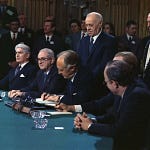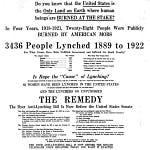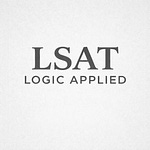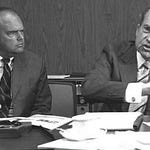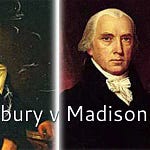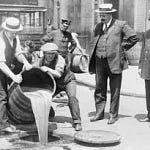We have a patent anniversary to acknowledge today as our “this day in legal history” entry. On this day in 1869, Thomas Alva Edison was granted a patent for an electric voting machine to be used by Congress.
The “Vote Recorder” was Edison's first patented invention and was specifically designed for legislative bodies like Congress. His motivation for creating this device came from reports in the Telegrapher, stating that the Washington, D.C., City Council and the New York State legislature were considering the installation of electric vote recorders. Edison's system involved each legislator moving a switch to indicate a "yes" or "no" vote, which transmitted a signal to a central recorder. The recorder had two columns of metal type labeled "Yes" and "No," where the names of the members were listed. A recording clerk would then place chemically prepared paper over the columns and roll a metallic roller over it, creating imprints of the names through chemical decomposition.
The machine also had dials on its sides to record the total number of "yeas" and "nays." Edison was granted U.S. Patent 90,646 for this invention on June 1, 1869. A fellow telegrapher named Dewitt Roberts bought a share in the invention for $100 and brought it to Washington, D.C., to demonstrate to a committee of Congress. However, the chairman of the committee was unimpressed with the device's speed in recording votes and stated that it was not something they wanted. The traditional roll call voting process, although slow, allowed members to filibuster or persuade others to change their votes, leading to the vote recorder's ultimate disuse.
Like so many great ideas, Edison’s invention died in committee.
The House of Representatives passed a debt-limit legislation proposed by President Joe Biden and Speaker Kevin McCarthy. The bill, approved with a 314-117 bipartisan vote, aims to impose spending restraints until the 2024 election and prevent a potential U.S. default. The agreement garnered support from two-thirds of House Republicans, boosting McCarthy's position as speaker. More Democrats voted in favor than Republicans and conservative critics argue that the deal was unfavorable. The bill now moves to the Senate, where approval is expected. The legislation suspends the debt ceiling until January 1, 2025, while Democrats agreed to cap federal spending until then. The agreement is seen as a rare moment of bipartisan accord in a divided Washington. Investors have already shifted their focus to other factors influencing growth, such as potential Federal Reserve interest rate increases and the weakening Chinese economy.
Debt-Limit Deal Wins House Passage, Easing US Default Concerns
Two members of the far-right Oath Keepers militant group are facing sentencing for seditious conspiracy and other crimes related to the January 6, 2021, attack on the U.S. Capitol by supporters of then-President Donald Trump. Prosecutors are requesting a 17-year prison sentence for each defendant. If the judge follows this recommendation, it would be among the longest sentences for anyone charged in the Capitol attack. The Oath Keepers founder, Stewart Rhodes, was recently sentenced to 18 years in prison, the longest sentence so far. The defense attorneys for the defendants argue that the evidence against their clients is weak and that the blame should be shifted to Trump for misleading his supporters.
More Oath Keepers convicted of sedition in US Capitol attack face sentencing | Reuters
Sam Bankman-Fried, the former chief executive of FTX cryptocurrency exchange, is seeking documents from Fenwick & West, the law firm that advised his defunct exchange, as he faces fraud charges. Bankman-Fried believes that the documents could help prove he relied on legal advice and did not knowingly break the law. The requested documents relate to matters central to the government's case, such as FTX's use of disappearing messaging services and failure to properly register with regulators. Bankman-Fried has pleaded not guilty to multiple charges, including fraud and conspiracy. Prosecutors have opposed his request, stating that his claims are meritless.
Bankman-Fried seeks documents from former FTX law firm in crypto fraud case | Reuters
Retired NYPD Sergeant Michael McMahon and two individuals accused of being Chinese agents are standing trial in Brooklyn for their alleged involvement in a plot to repatriate a former Chinese government official residing in New Jersey. This case is part of Operation Fox Hunt, an initiative by the Chinese government to coerce Chinese nationals living abroad to return to China through tactics such as harassment and threats. The defendants are the first to be tried in the United States in connection with this operation. McMahon, along with Yong Zhu and Congying Zhen, allegedly used the elderly father of their target as bait to warn him about the consequences of not returning to China. McMahon, hired as a private investigator, is accused of surveilling the target, while Zhen is accused of harassing the target and his daughter. The prosecution argues that each defendant played a role in the Chinese government's efforts to intimidate and threaten the victim. McMahon has pleaded not guilty, claiming he was unaware of the true intent behind the scheme. The trial is expected to last two to three weeks, and if convicted, McMahon could face up to 10 years in prison.
Ex-NYPD Sgt., others accused of harassing and intimidating Chinese dissidents in US - ABC7 New York
Pet supply retailer Chewy Inc has won a challenge to a fine imposed by the U.S. Occupational Safety and Health Administration (OSHA) over a forklift accident that resulted in the death of a warehouse worker. The 11th U.S. Circuit Court of Appeals ruled unanimously that Chewy did not violate federal workplace safety law because it had complied with a specific rule governing forklifts. OSHA had fined Chewy around $13,000 in 2019 following the accident in Florida, but the court found that the company had provided the required training and that the OSHA rule on forklifts applied, preempting the general duty to protect workers. The court's decision highlighted that the retail industry generally does not consider eliminating "under-rides" necessary and that doing so could actually increase the risk of accidents. For those that don’t moonlight as forklift operators, an “under-ride” is when a forklift operator reverses towards a storage rack with the forks trailing. If the operator extends the forklift too far, causing it to pass beneath the horizontal crossbar, it creates an "under-ride" situation. In such cases, the crossbar can enter the operator's compartment and result in injury. Essentially, it is running a fork-lift backwards such that the front safety mechanisms are not the first thing to hit a shelf – you are. So now you know.
Pet goods supplier Chewy wins challenge to OSHA fine over worker death | Reuters






